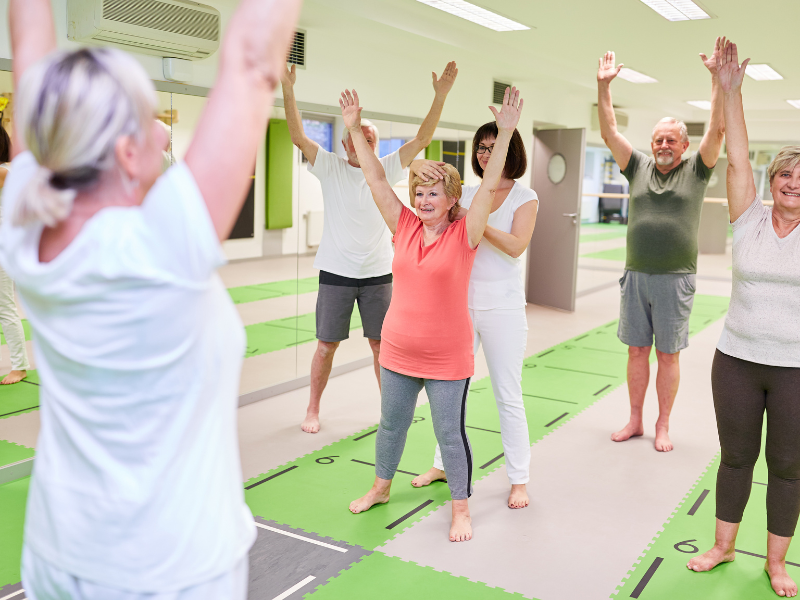Guidance for Seniors to Prioritize Their Overall Health to Reduce Fall Risks

Author: Home Helpers Home Care
One of our senior clients with Parkinson’s disease suffers from the usual symptoms of the condition, which include balance problems and falling. Sometimes, he falls multiple times in a single day, which is a great concern for his family and caregivers.
September is Falls Prevention Month to raise awareness about preventing falls, reducing the risk of falls, and helping older adults live without fear of falling.
Northwestern Medicine (NM) offers guidance for seniors to prioritize their overall health to reduce fall risks.
“An existing health problem can increase your risk for falls. Taking certain kinds of medicines may also raise your risk for falls. So improving your health can help you lower your risk. Work with your health care provider to manage health problems and review your medicines,” explains NM.
Chronic conditions increase fall risks.
Chronic health conditions, like diabetes, high or low blood pressure, and arthritis, don’t disappear, but they can be managed with the right care. These conditions may affect your mobility, balance, or even vision. On top of that, some of the medications used to treat them can cause side effects such as dizziness or drowsiness, which can increase the risk of falls.
Consult with your health care provider.
Your healthcare provider is an important partner in helping you prevent falls. Make it a priority to schedule a yearly exam, and don’t wait if you’re experiencing symptoms like dizziness or leg numbness, which can increase your fall risk. Be sure to share any history of falls and bring a current list of your medications so your provider can review them with you. It’s also a good time to talk about your nutrition and exercise habits and ask whether any tests might help check your fall risk.
Review your medications.
Even over-the-counter medicines can have side effects that raise your risk of falling. Medications for blood pressure, heart conditions, pain, sleep, or depression are especially common culprits. If you take pain medicine, be sure to store it safely in an upper cabinet in your kitchen or bathroom. Keep all medications in their original containers with clear labels and avoid mixing different pills in the same bottle. This simple habit reduces the chance of taking the wrong medication or the wrong dose, both of which can cause side effects that may increase your fall risk.
As we age, our bodies can respond to medicines differently. A prescription or over-the-counter drug that once worked well for you may now cause unwanted side effects. That’s why it’s so important to have your healthcare provider or pharmacist review your medications regularly and adjust them if needed.
Get your vision and hearing checked.
Problems with vision or hearing can lead to falls. NM recommends:
- Get your eyes checked at least once a year. Take time to adjust to new glasses.
- Get your hearing checked at least every other year.
- Have your health care provider check for problems that may affect your balance.
Proper nutrition is vital.
If you don't eat properly, you can become dizzy and fall.
- Stay hydrated throughout the day, even if you don't feel thirsty. Your sense of thirst tends to decrease with age.
- Eat breakfast every morning, and plan regular meals and healthy snacks.
- Ask your healthcare provider if you need supplements. These can help strengthen your bones and muscles to help prevent falls. They can also help prevent fractures if you do fall.
- Don't smoke and reduce the amount of alcohol you consume.
Stay active and exercise as much as possible.
Staying active is one of the most effective ways to prevent falls. But remember, too little activity can be just as risky as overdoing it. A sedentary lifestyle can weaken your muscles and make falls more likely. Regular exercise helps improve balance, flexibility, strength, and endurance, all key factors in fall prevention. Check with your healthcare provider about any activity limitations you may have and discuss which types of exercise are safest and most effective for you.
Know when you should contact your healthcare provider.
You should contact your health care provider if you fall. Call if you have any of the following symptoms:
- Dizziness or light-headedness
- Loss of balance or unsteadiness on your feet
- Numbness in your legs or feet, or changes in your gait
- A decline in your memory or mental sharpness
Falls among seniors continue to be a national public health concern, because older adults who experience falls are at greater risk of significant injury or even death.
My care team at Home Helpers is highly trained and skilled to provide an array of in-home care services and support, including specialized care for clients with Parkinson’s disease, Alzheimer’s and dementia, as well as 24-hour shift care.
In addition, for seniors living alone, we offer a state-of-the-art 24-monitoring service by Direct Link® that includes fall detection technology, so human help is instantly available at the touch of a button.
I will gladly sit down with you or your senior loved one for a FREE Consultation and home safety check to assess specific needs and discuss the many ways Home Helpers can make life easier and safer every day.
Home Helpers® Wheaton & Naperville is proudly Making Life Easier℠ for veterans, differently-abled, and senior men and women in Aurora, Bartlett, Bloomingdale, Hanover Park, Hoffman Estates, Itasca, Medinah, Mooseheart, Naperville, Plainfield, Roselle, Schaumburg, Warrenville, West Chicago, Wheaton, and Winfield.
Source:
